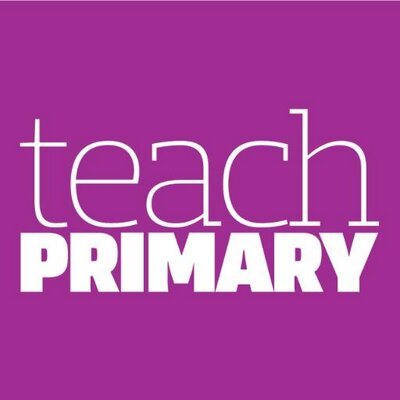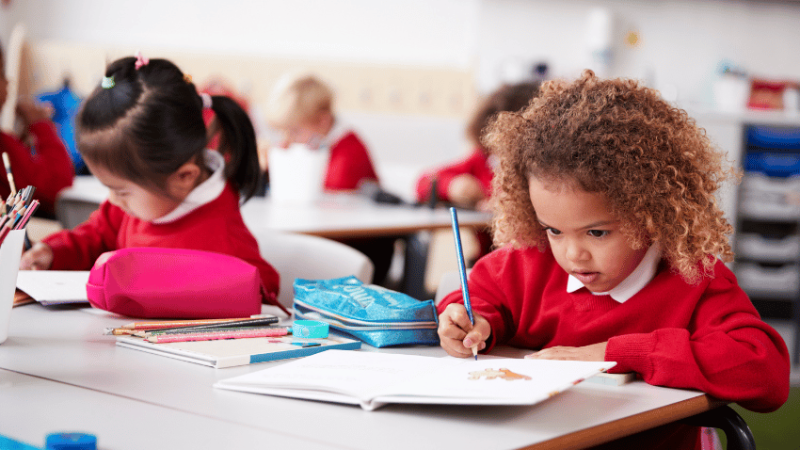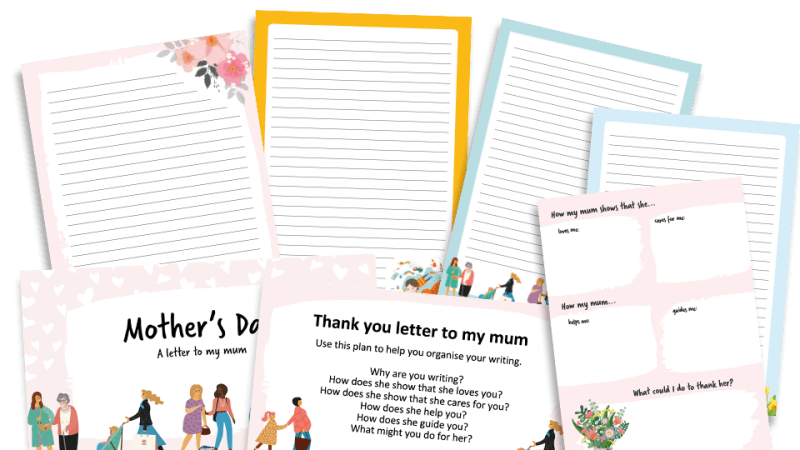How Curwen Primary School is providing a service to pupils and parents alike
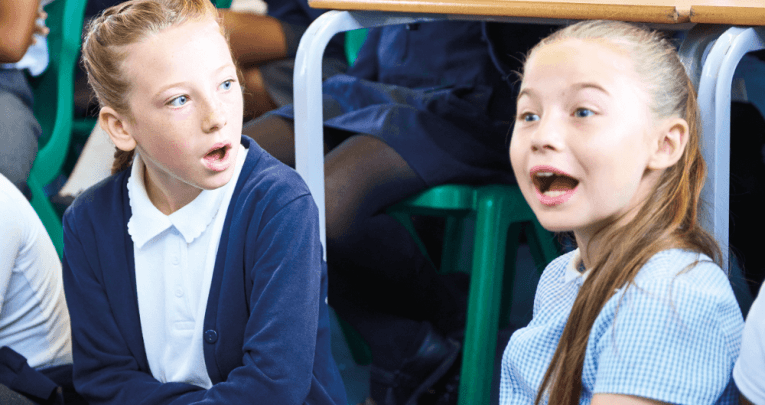
“Most of the time, if you’ve got good-quality teaching, you’ll have excellent behaviour,” says Executive Headteacher Paul Harris…

A selection of Curwen Primary’s pupils are sitting around me in the office, politely answering my questions. We’re just about done but one puts his hand up.
“I’d like to ask you a question.” The tables have been turned and for the next 15 minutes I find myself being interviewed about my career, my age, my family. These are inquisitive young minds but eventually I have to call time.
Executive headteacher Paul Harris is patiently waiting for me to vacate his chair so he can get back to work.
And he’s a busy man. Not only is he executive head at Curwen, in the East London borough of Newham, but also CEO of the wider Tapscott Learning Trust, which includes four other schools. It’s a lot to oversee – but so is Curwen itself: four-form entry, nursery with 104 part-time places (52 in the morning, 52 in the afternoon). In total, the school has over 980 children, and more than 150 members of staff.
Curwen has what Paul describes as “a wide number of socio-economic factors”. The are many different cultures represented among the intake, with over 40 languages spoken.
It’s a school that has evolved over time. And some of its biggest changes have occurred in the last 13 years, during the time since Paul first arrived, originally as headteacher.
Back then it was two-from entry. Over the years the building has been completely remodelled in four phases, but the school was a very different place in other ways too, as Paul explains.
“Back then, in 2006, you were looking at 17 fixed-term exclusions in one year. We had a turnover of 18 members of staff. It had very poor relationships with the community and there was very little communication. Results were also significantly lower at that point.”
Paul delights in painting the new picture: “We no longer have any exclusions. It’s been six years since we had to hand out a fixed-term exclusion. Behaviour is excellent. We’ve improved our curriculum and have excellent relations with parents.”
The school’s official rating has reflected the work being done in the name of improvement. A judgement of ‘satisfactory’ was handed down by Ofsted shortly after Paul’s arrival, and then in 2009 the school was classed as outstanding.
“We haven’t received an Ofsted since then, which isn’t the best, but we continue to always push ourselves,” says Paul. “We have been very successful in attainment and achievement, consistently, for a long time.” The school has many credits to its name. It has been a national support school since 2011 and Paul himself is a national leader of education.
“We have a number of kite marks,” Paul explains. “We were the first primary school in the country to have platinum sports marks. We’ve got gold art marks, geography mark. We use them as a way of ensuring we’re constantly checking our delivery to give the best to the children.”
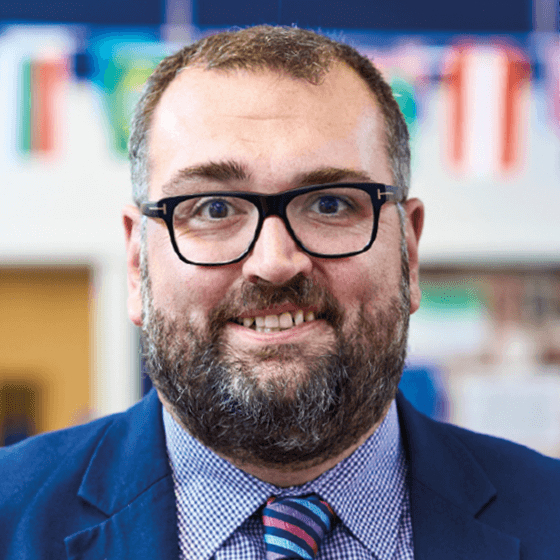 Name: Curwen Primary School
Executive headteacher: Paul Harris
Location: Newham, East London
Ofsted rating: Outstanding
Size: Approx 980 pupils
Extra info: Belongs to the Tapscott Learning Trust
Name: Curwen Primary School
Executive headteacher: Paul Harris
Location: Newham, East London
Ofsted rating: Outstanding
Size: Approx 980 pupils
Extra info: Belongs to the Tapscott Learning Trust
1 | Relationships
So, back to those changes. What have been the main drivers? “One of the keys was improving the relationships with parents, and also with children,” says Paul. “We wanted the children to come to school and be at the school, so we needed to look at behaviour and accessibility. We needed to understand what the barriers were to people engaging with the school and we needed to find out why the children weren’t achieving at the level they could do.”
Much of this, explains Paul, came down to clear line management. Structures needed to be put into place, and people had to understand what their role was within them as the picture was “was quite confused” when Paul arrived, with a tortuous decision-making process. “When I got here, they couldn’t even go to a football match before I’d signed it off.” So “delegated and distributed leadership” needed to be embedded, with the appropriate training put in place. Paul recalls there were some quick wins. “In the first year you could see there was a slight shift,” he says. But it was three or four years before the changes became embedded.
“A milestone was after seven years,” says Paul, “when the first wave of children who had been here when I started had gone all the way through the school.”
Since then, Paul proudly reports that Curwen has been consistently “in the top five to ten per cent of the country”. A number of awards have followed. “But it’s not about that,” says Paul. “It’s more about showing what children from this area can achieve and that they’re not a write-off.”
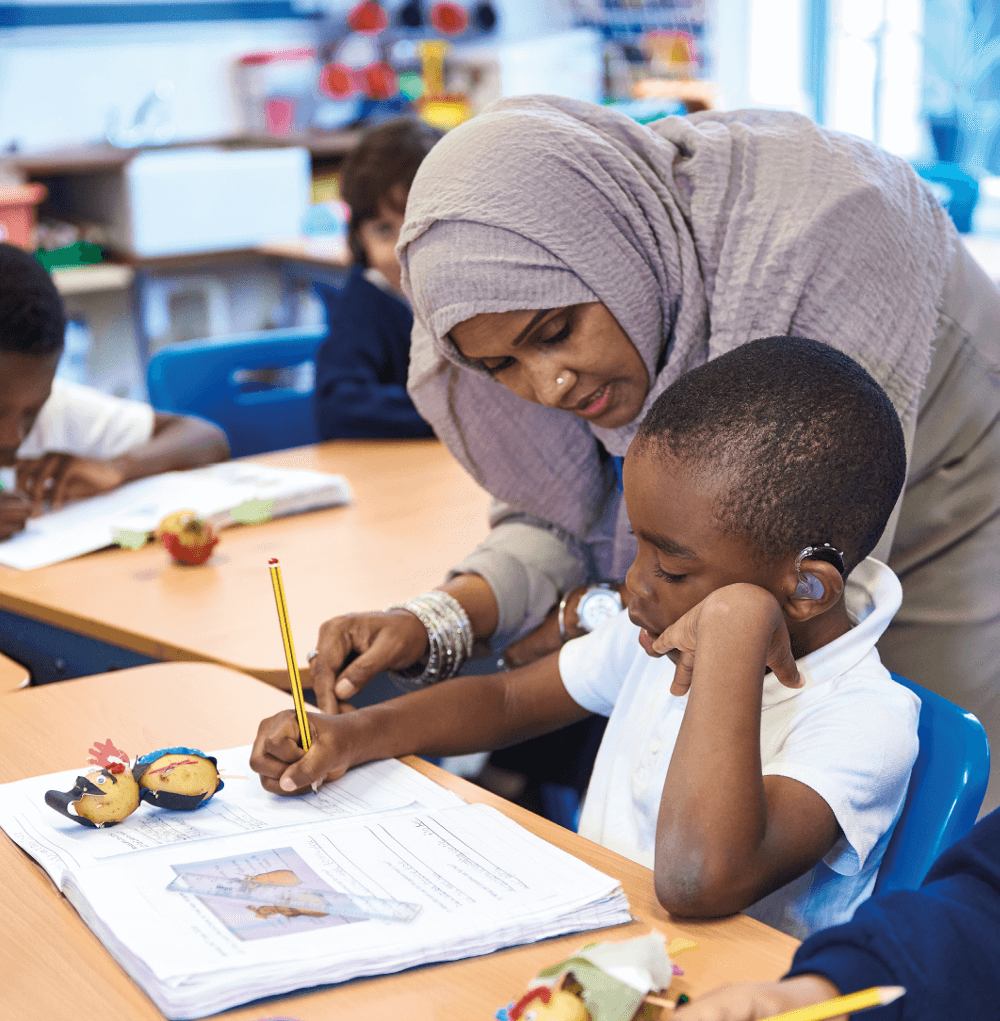
2 | Engagement
Any plaudits have been the result of hard work in many different areas. Paul says it was a case of looking at what was working and what wasn’t.
“The curriculum needed to be overhauled to ensure that it was actually fit for purpose. But it was actually engaging, so one of the first things we did, and we’ve continued to do to this day, was look at extra-curricular activities and the impact of educational visits on children’s attainment. We’ve managed to really focus on that and look at how that can engage the children.”
However, Paul explains it has been necessary to change mindsets and the way the school is viewed by everyone. “Our key word in behaviour rules is ‘respect’ – and that means respect at all levels.”
Paul admits his first year was a baptism of fire. “You would have children flipping tables and throwing things at each other. Pretty serious stuff. We don’t have any of that now. We’ve worked very hard together to ensure that type of behaviour is not there.”
Some of the measures didn’t go down well at first with some parents. But, Paul explains, “if your child is representing the school in a sports team or going somewhere, they have to be behaving well before they’re allowed to go and do that”.
However, the involvement of parents over time has helped to build Curwen’s success. But it has required work and different approaches. “When it came to parent relationships, something I found was that I could offer 20 courses on English reading and writing and parents just weren’t engaged with that,” says Paul. “A lot of them had very negative experiences in school, so we had to approach it in a very different way. In the first few years – and again, we’ve continued to do these things but they’ve increased in magnitude – we did a family week, where we’d get parents involved, not just on the academic side, but engaging them in things like cooking, rather than the scary bits like English and maths.”
The initiatives have grown impressively. “I think we had around 50 parents in the first year who engaged with family week. We recently had our latest one and we’re talking at least 600 to 700 parents involved. So, 200 families went to the park, for example, 200 families went to Chessington. And then we also do all the educational things. They come in to do Zumba and they’re really involved now.”
Increased parental engagement is also evident at open evenings, where parent attendance in 2006 was below 60 per cent and is now consistently above 98 per cent.
There have also been big wins when it comes to the engagement of the children. There’s the school council, for example, through which they are able to have their voices heard. “All children have the opportunity to say what they’re interested in learning,” explains Paul, “so the curriculum is adapted year on year to try and focus on those areas.”
Research has also been used to identify issues. “For example,” says Paul, “about six years ago we did a study and found that 70 per cent of our children didn’t know where the river Thames was, and they’d never visited it – and it’s down the road! So that led to a curriculum change for a term where we made the Thames a topic for everyone, and we took the whole school on the river to really get them starting to engage with the local area.”
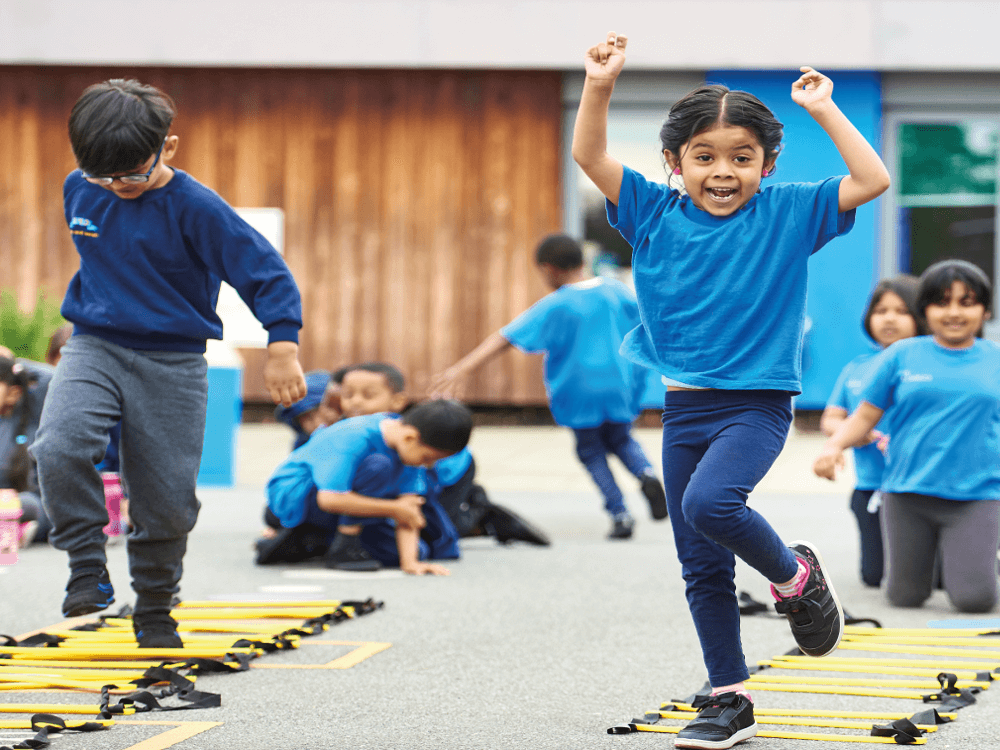
3 | Support
While Curwen’s core business is education, Paul believes in removing the barriers of issues at home and offering support to the families and children in order to move forward with them. “As we’ve developed over time, we’ve moved much more into areas of mental health and wellbeing for the children,” he explains. The school, for example, works with the charity Place2Be. “it’s all about the community,” says Paul. “Benefit cuts have had a massive effect on the poverty level for some of our families. Even things like Brexit have had an impact on the things we do, and we have to be there in the community, front of office, to meet those needs of the children and the parents. In order to do that we have to have an incredibly diverse and effective team that have specialisms in a lot of different areas, not just teaching. I see us as the front-line service. Most parents will come to us first, then go to other services.” Part of the school’s service is wraparound care, which starts at 7.45am with a breakfast club (with an average of over 120 pupils). There are also extra-curricular activities and, from 3pm to 6pm, a 6 o’clock club (attended by 80 to 90 pupils).
“That has allowed a number of parents to get back into work but it also allows parents who now live further out to keep their children here,” says Paul. Life in the area has its challenges, which the executive head is quick to acknowledge, and the school staff are always to ready help when they’re needed. Fittingly, the sound of sirens fills the air as Paul gives me an example. “When I was walking here a few days ago they were airlifting someone from the station who had just been stabbed – and this was 2.30 in the afternoon. You have children going home in the aftermath of that. If that happens, the staff are so dedicated that they will actually hold all the children who go home on their own and then take them to their houses or walk them around different ways if there’s a crime scene. I’m not trying to make out the area is like that all the time. But when it does happen, the dedication of the staff really shines through.”
4 | Driving force
The staff are very committed to giving the very best for the children of Curwen, Paul explains, and that does require going above and beyond sometimes. “You can imagine the organisation required to take 900 children for sports day. But it’s done seamlessly, with the staff really thinking out all the different ways in which that can work.” Curwen doesn’t have a very active PTA, Paul admits “It had two members, then three, then went back to one. We try but the parents have their own challenges. So, it’s the school that will run the Easter bonnet parades, the school discos, the summer fair, the Christmas fair. It’s the staff that drive that. But I think it’s really important that we do all those things, which some heads don’t agree with. They think they’re just there to do English, maths and so on. But for me, you are the hub of the community, and you have to work with what you’ve got. Some school have amazing PTAs who raise £20,000. We’re happy if we do the summer fair and raise £1,000.” Curwen has also focused on the children becoming their own leaders. The list of available positions of responsibility is long: sports leaders, school councillors, reading buddies, buddies in classes for new children, EAL leaders, junior leaders for walking to school, junior travel officers. “They elect themselves to those posts,” Paul explains. “It’s always about how we can develop them and what more we can do, and at the same time deliver a really effective education that engages the children.” It’s yet another way of building the community feel within the school. “You have to adapt all the time,” says Paul. “It’s never boring!”
Student voice
Amira
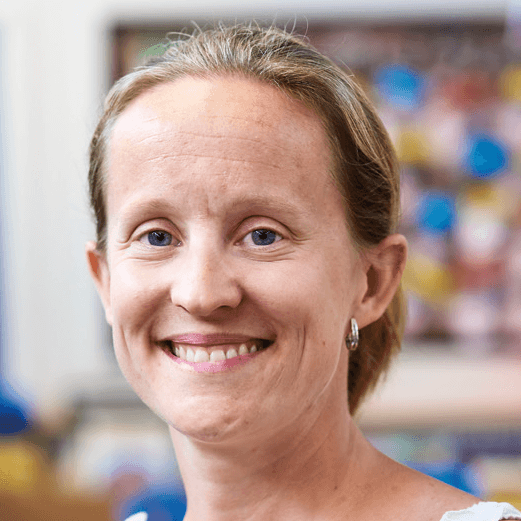 We’re very family and community oriented at this school. I was a class pupil here. I only left for secondary school really and came back. I did my training here and worked my way up. I think CPD at this school is definitely key. SMT look at people and their interests and skills and are serious about developing them further.
We’re very family and community oriented at this school. I was a class pupil here. I only left for secondary school really and came back. I did my training here and worked my way up. I think CPD at this school is definitely key. SMT look at people and their interests and skills and are serious about developing them further.
Sam Turpin, PE
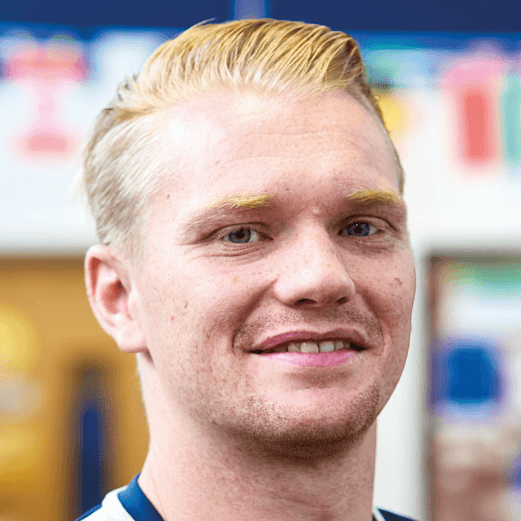 I also came to school here. It’s a really inclusive. All cultures and all religions all get the same opportunity here. The children really enjoy the leadership opportunities. They can be peer mentors, and we have sports leaders in the playground every lunchtime. I think they thrive on it and it helps them interact with their peers in a positive way.
I also came to school here. It’s a really inclusive. All cultures and all religions all get the same opportunity here. The children really enjoy the leadership opportunities. They can be peer mentors, and we have sports leaders in the playground every lunchtime. I think they thrive on it and it helps them interact with their peers in a positive way.
5 ideas to magpie from Curwen Primary
Involve parents and build community links with specially themed weeks. Paul explains: “We have family week, international week and world of work week, where parents and outsiders come in to engage with the children.”
Build trust by actively engaging with the local area. “You have to be out there talking to them every day but also walking around the community,” says Paul. “I can walk around here now and most people will know me.”
Put trust in the children. Pupils at Curwen receive team tokens for good work and behaviour and are trusted to count the tokens themselves each week to find out the winner.
Use support staff effectively. “We don’t have support staff who just washing out pots,” explains Paul. “We have 15 members who have all been trained in Elklan, which is a speech and language programme, up to level three. They are an essential tool in working with a range of children.”
Treat all teaching staff as leaders. “They are leading that classroom,” says Paul. “It’s not me. They’re in charge of that learning.”
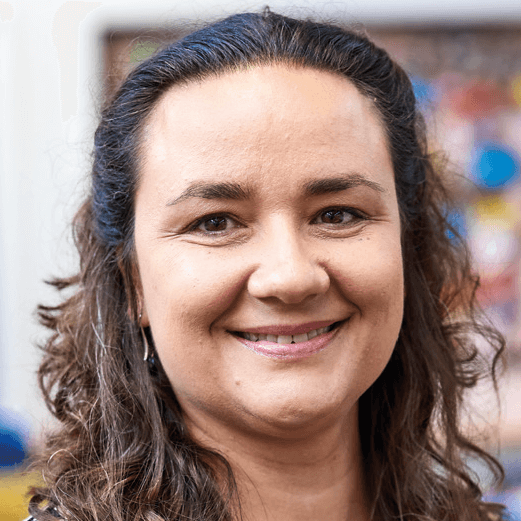 I’ve been here since 2005 and I feel like part of the school. We look at the wider development of the child in its entirety, including wellbeing. We provide a lot of support for every different area of development. So it’s not just the academic aspects. All children have a sense of belonging here and the parents really appreciate that.
I’ve been here since 2005 and I feel like part of the school. We look at the wider development of the child in its entirety, including wellbeing. We provide a lot of support for every different area of development. So it’s not just the academic aspects. All children have a sense of belonging here and the parents really appreciate that.
Kate Miles, assistant head, SENDCo
 We’re very family and community oriented at this school. I was a class pupil here. I only left for secondary school really and came back. I did my training here and worked my way up. I think CPD at this school is definitely key. SMT look at people and their interests and skills and are serious about developing them further.
We’re very family and community oriented at this school. I was a class pupil here. I only left for secondary school really and came back. I did my training here and worked my way up. I think CPD at this school is definitely key. SMT look at people and their interests and skills and are serious about developing them further.
Sam Turpin, PE
 I also came to school here. It’s a really inclusive. All cultures and all religions all get the same opportunity here. The children really enjoy the leadership opportunities. They can be peer mentors, and we have sports leaders in the playground every lunchtime. I think they thrive on it and it helps them interact with their peers in a positive way.
I also came to school here. It’s a really inclusive. All cultures and all religions all get the same opportunity here. The children really enjoy the leadership opportunities. They can be peer mentors, and we have sports leaders in the playground every lunchtime. I think they thrive on it and it helps them interact with their peers in a positive way.
5 ideas to magpie from Curwen Primary
Involve parents and build community links with specially themed weeks. Paul explains: “We have family week, international week and world of work week, where parents and outsiders come in to engage with the children.”
Build trust by actively engaging with the local area. “You have to be out there talking to them every day but also walking around the community,” says Paul. “I can walk around here now and most people will know me.”
Put trust in the children. Pupils at Curwen receive team tokens for good work and behaviour and are trusted to count the tokens themselves each week to find out the winner.
Use support staff effectively. “We don’t have support staff who just washing out pots,” explains Paul. “We have 15 members who have all been trained in Elklan, which is a speech and language programme, up to level three. They are an essential tool in working with a range of children.”
Treat all teaching staff as leaders. “They are leading that classroom,” says Paul. “It’s not me. They’re in charge of that learning.”
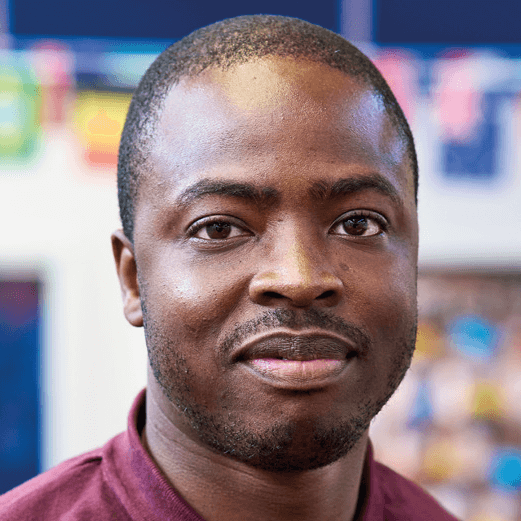 What makes the school special is the constant opportunities offered to everyone – the children, the staff. We’re like a giant family. The children embrace each other’s different cultures. Once you’re in here, you don’t want to leave. We listen to each other, whether teachers or students, and there’s a collaborative culture so we work together for the best outcomes.
What makes the school special is the constant opportunities offered to everyone – the children, the staff. We’re like a giant family. The children embrace each other’s different cultures. Once you’re in here, you don’t want to leave. We listen to each other, whether teachers or students, and there’s a collaborative culture so we work together for the best outcomes.
Polly Hristova, Y3 head
 I’ve been here since 2005 and I feel like part of the school. We look at the wider development of the child in its entirety, including wellbeing. We provide a lot of support for every different area of development. So it’s not just the academic aspects. All children have a sense of belonging here and the parents really appreciate that.
I’ve been here since 2005 and I feel like part of the school. We look at the wider development of the child in its entirety, including wellbeing. We provide a lot of support for every different area of development. So it’s not just the academic aspects. All children have a sense of belonging here and the parents really appreciate that.
Kate Miles, assistant head, SENDCo
 We’re very family and community oriented at this school. I was a class pupil here. I only left for secondary school really and came back. I did my training here and worked my way up. I think CPD at this school is definitely key. SMT look at people and their interests and skills and are serious about developing them further.
We’re very family and community oriented at this school. I was a class pupil here. I only left for secondary school really and came back. I did my training here and worked my way up. I think CPD at this school is definitely key. SMT look at people and their interests and skills and are serious about developing them further.
Sam Turpin, PE
 I also came to school here. It’s a really inclusive. All cultures and all religions all get the same opportunity here. The children really enjoy the leadership opportunities. They can be peer mentors, and we have sports leaders in the playground every lunchtime. I think they thrive on it and it helps them interact with their peers in a positive way.
I also came to school here. It’s a really inclusive. All cultures and all religions all get the same opportunity here. The children really enjoy the leadership opportunities. They can be peer mentors, and we have sports leaders in the playground every lunchtime. I think they thrive on it and it helps them interact with their peers in a positive way.
5 ideas to magpie from Curwen Primary
Involve parents and build community links with specially themed weeks. Paul explains: “We have family week, international week and world of work week, where parents and outsiders come in to engage with the children.”
Build trust by actively engaging with the local area. “You have to be out there talking to them every day but also walking around the community,” says Paul. “I can walk around here now and most people will know me.”
Put trust in the children. Pupils at Curwen receive team tokens for good work and behaviour and are trusted to count the tokens themselves each week to find out the winner.
Use support staff effectively. “We don’t have support staff who just washing out pots,” explains Paul. “We have 15 members who have all been trained in Elklan, which is a speech and language programme, up to level three. They are an essential tool in working with a range of children.”
Treat all teaching staff as leaders. “They are leading that classroom,” says Paul. “It’s not me. They’re in charge of that learning.”
Samuel Adejoke, Y6 teacher & computer lead
 What makes the school special is the constant opportunities offered to everyone – the children, the staff. We’re like a giant family. The children embrace each other’s different cultures. Once you’re in here, you don’t want to leave. We listen to each other, whether teachers or students, and there’s a collaborative culture so we work together for the best outcomes.
What makes the school special is the constant opportunities offered to everyone – the children, the staff. We’re like a giant family. The children embrace each other’s different cultures. Once you’re in here, you don’t want to leave. We listen to each other, whether teachers or students, and there’s a collaborative culture so we work together for the best outcomes.
Polly Hristova, Y3 head
 I’ve been here since 2005 and I feel like part of the school. We look at the wider development of the child in its entirety, including wellbeing. We provide a lot of support for every different area of development. So it’s not just the academic aspects. All children have a sense of belonging here and the parents really appreciate that.
I’ve been here since 2005 and I feel like part of the school. We look at the wider development of the child in its entirety, including wellbeing. We provide a lot of support for every different area of development. So it’s not just the academic aspects. All children have a sense of belonging here and the parents really appreciate that.
Kate Miles, assistant head, SENDCo
 We’re very family and community oriented at this school. I was a class pupil here. I only left for secondary school really and came back. I did my training here and worked my way up. I think CPD at this school is definitely key. SMT look at people and their interests and skills and are serious about developing them further.
We’re very family and community oriented at this school. I was a class pupil here. I only left for secondary school really and came back. I did my training here and worked my way up. I think CPD at this school is definitely key. SMT look at people and their interests and skills and are serious about developing them further.
Sam Turpin, PE
 I also came to school here. It’s a really inclusive. All cultures and all religions all get the same opportunity here. The children really enjoy the leadership opportunities. They can be peer mentors, and we have sports leaders in the playground every lunchtime. I think they thrive on it and it helps them interact with their peers in a positive way.
I also came to school here. It’s a really inclusive. All cultures and all religions all get the same opportunity here. The children really enjoy the leadership opportunities. They can be peer mentors, and we have sports leaders in the playground every lunchtime. I think they thrive on it and it helps them interact with their peers in a positive way.
5 ideas to magpie from Curwen Primary
Involve parents and build community links with specially themed weeks. Paul explains: “We have family week, international week and world of work week, where parents and outsiders come in to engage with the children.”
Build trust by actively engaging with the local area. “You have to be out there talking to them every day but also walking around the community,” says Paul. “I can walk around here now and most people will know me.”
Put trust in the children. Pupils at Curwen receive team tokens for good work and behaviour and are trusted to count the tokens themselves each week to find out the winner.
Use support staff effectively. “We don’t have support staff who just washing out pots,” explains Paul. “We have 15 members who have all been trained in Elklan, which is a speech and language programme, up to level three. They are an essential tool in working with a range of children.”
Treat all teaching staff as leaders. “They are leading that classroom,” says Paul. “It’s not me. They’re in charge of that learning.”
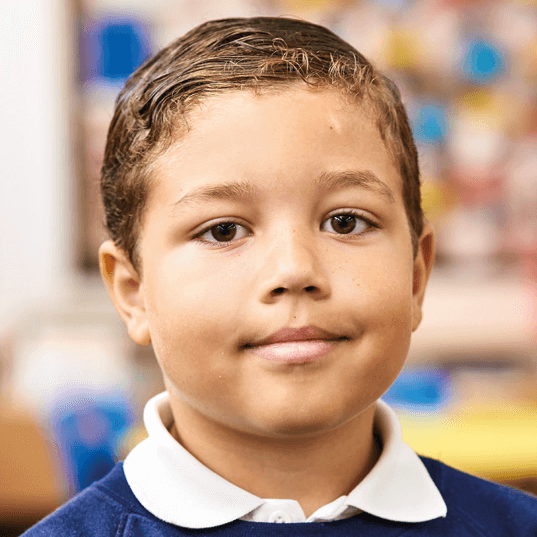 Most of the lessons are very educational but some of them are just fun. Once we made a volcano and I really enjoyed that. I like art, DT and literacy. I also like maths because that will help you in everyday life.
Most of the lessons are very educational but some of them are just fun. Once we made a volcano and I really enjoyed that. I like art, DT and literacy. I also like maths because that will help you in everyday life.
Raj
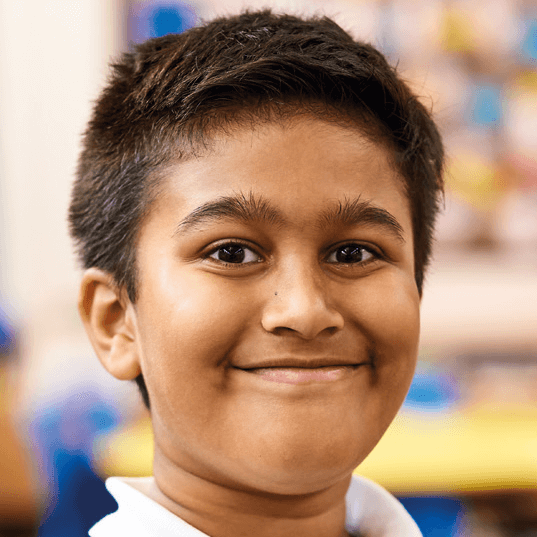 The best thing about coming to this school is get to play with my friends and get support from the teachers. I like all the subjects we are taught. I like the clubs too. I’ve done computer club and Spanish club.
The best thing about coming to this school is get to play with my friends and get support from the teachers. I like all the subjects we are taught. I like the clubs too. I’ve done computer club and Spanish club.
Meet the staff
Samuel Adejoke, Y6 teacher & computer lead
 What makes the school special is the constant opportunities offered to everyone – the children, the staff. We’re like a giant family. The children embrace each other’s different cultures. Once you’re in here, you don’t want to leave. We listen to each other, whether teachers or students, and there’s a collaborative culture so we work together for the best outcomes.
What makes the school special is the constant opportunities offered to everyone – the children, the staff. We’re like a giant family. The children embrace each other’s different cultures. Once you’re in here, you don’t want to leave. We listen to each other, whether teachers or students, and there’s a collaborative culture so we work together for the best outcomes.
Polly Hristova, Y3 head
 I’ve been here since 2005 and I feel like part of the school. We look at the wider development of the child in its entirety, including wellbeing. We provide a lot of support for every different area of development. So it’s not just the academic aspects. All children have a sense of belonging here and the parents really appreciate that.
I’ve been here since 2005 and I feel like part of the school. We look at the wider development of the child in its entirety, including wellbeing. We provide a lot of support for every different area of development. So it’s not just the academic aspects. All children have a sense of belonging here and the parents really appreciate that.
Kate Miles, assistant head, SENDCo
 We’re very family and community oriented at this school. I was a class pupil here. I only left for secondary school really and came back. I did my training here and worked my way up. I think CPD at this school is definitely key. SMT look at people and their interests and skills and are serious about developing them further.
We’re very family and community oriented at this school. I was a class pupil here. I only left for secondary school really and came back. I did my training here and worked my way up. I think CPD at this school is definitely key. SMT look at people and their interests and skills and are serious about developing them further.
Sam Turpin, PE
 I also came to school here. It’s a really inclusive. All cultures and all religions all get the same opportunity here. The children really enjoy the leadership opportunities. They can be peer mentors, and we have sports leaders in the playground every lunchtime. I think they thrive on it and it helps them interact with their peers in a positive way.
I also came to school here. It’s a really inclusive. All cultures and all religions all get the same opportunity here. The children really enjoy the leadership opportunities. They can be peer mentors, and we have sports leaders in the playground every lunchtime. I think they thrive on it and it helps them interact with their peers in a positive way.
5 ideas to magpie from Curwen Primary
Involve parents and build community links with specially themed weeks. Paul explains: “We have family week, international week and world of work week, where parents and outsiders come in to engage with the children.”
Build trust by actively engaging with the local area. “You have to be out there talking to them every day but also walking around the community,” says Paul. “I can walk around here now and most people will know me.”
Put trust in the children. Pupils at Curwen receive team tokens for good work and behaviour and are trusted to count the tokens themselves each week to find out the winner.
Use support staff effectively. “We don’t have support staff who just washing out pots,” explains Paul. “We have 15 members who have all been trained in Elklan, which is a speech and language programme, up to level three. They are an essential tool in working with a range of children.”
Treat all teaching staff as leaders. “They are leading that classroom,” says Paul. “It’s not me. They’re in charge of that learning.”
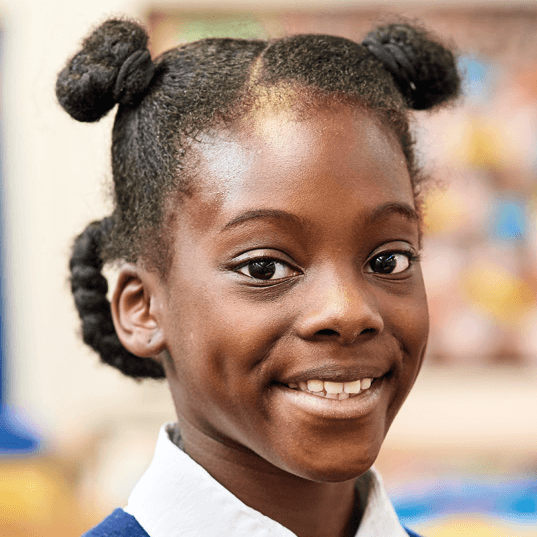 At some schools the teachers don’t really talk about what you do outside of school but at this school, if you achieve something, you can bring in your medals and show people. I really love DT because I like food.
At some schools the teachers don’t really talk about what you do outside of school but at this school, if you achieve something, you can bring in your medals and show people. I really love DT because I like food.
Marcus
 Most of the lessons are very educational but some of them are just fun. Once we made a volcano and I really enjoyed that. I like art, DT and literacy. I also like maths because that will help you in everyday life.
Most of the lessons are very educational but some of them are just fun. Once we made a volcano and I really enjoyed that. I like art, DT and literacy. I also like maths because that will help you in everyday life.
Raj
 The best thing about coming to this school is get to play with my friends and get support from the teachers. I like all the subjects we are taught. I like the clubs too. I’ve done computer club and Spanish club.
The best thing about coming to this school is get to play with my friends and get support from the teachers. I like all the subjects we are taught. I like the clubs too. I’ve done computer club and Spanish club.
Meet the staff
Samuel Adejoke, Y6 teacher & computer lead
 What makes the school special is the constant opportunities offered to everyone – the children, the staff. We’re like a giant family. The children embrace each other’s different cultures. Once you’re in here, you don’t want to leave. We listen to each other, whether teachers or students, and there’s a collaborative culture so we work together for the best outcomes.
What makes the school special is the constant opportunities offered to everyone – the children, the staff. We’re like a giant family. The children embrace each other’s different cultures. Once you’re in here, you don’t want to leave. We listen to each other, whether teachers or students, and there’s a collaborative culture so we work together for the best outcomes.
Polly Hristova, Y3 head
 I’ve been here since 2005 and I feel like part of the school. We look at the wider development of the child in its entirety, including wellbeing. We provide a lot of support for every different area of development. So it’s not just the academic aspects. All children have a sense of belonging here and the parents really appreciate that.
I’ve been here since 2005 and I feel like part of the school. We look at the wider development of the child in its entirety, including wellbeing. We provide a lot of support for every different area of development. So it’s not just the academic aspects. All children have a sense of belonging here and the parents really appreciate that.
Kate Miles, assistant head, SENDCo
 We’re very family and community oriented at this school. I was a class pupil here. I only left for secondary school really and came back. I did my training here and worked my way up. I think CPD at this school is definitely key. SMT look at people and their interests and skills and are serious about developing them further.
We’re very family and community oriented at this school. I was a class pupil here. I only left for secondary school really and came back. I did my training here and worked my way up. I think CPD at this school is definitely key. SMT look at people and their interests and skills and are serious about developing them further.
Sam Turpin, PE
 I also came to school here. It’s a really inclusive. All cultures and all religions all get the same opportunity here. The children really enjoy the leadership opportunities. They can be peer mentors, and we have sports leaders in the playground every lunchtime. I think they thrive on it and it helps them interact with their peers in a positive way.
I also came to school here. It’s a really inclusive. All cultures and all religions all get the same opportunity here. The children really enjoy the leadership opportunities. They can be peer mentors, and we have sports leaders in the playground every lunchtime. I think they thrive on it and it helps them interact with their peers in a positive way.
5 ideas to magpie from Curwen Primary
Involve parents and build community links with specially themed weeks. Paul explains: “We have family week, international week and world of work week, where parents and outsiders come in to engage with the children.”
Build trust by actively engaging with the local area. “You have to be out there talking to them every day but also walking around the community,” says Paul. “I can walk around here now and most people will know me.”
Put trust in the children. Pupils at Curwen receive team tokens for good work and behaviour and are trusted to count the tokens themselves each week to find out the winner.
Use support staff effectively. “We don’t have support staff who just washing out pots,” explains Paul. “We have 15 members who have all been trained in Elklan, which is a speech and language programme, up to level three. They are an essential tool in working with a range of children.”
Treat all teaching staff as leaders. “They are leading that classroom,” says Paul. “It’s not me. They’re in charge of that learning.”
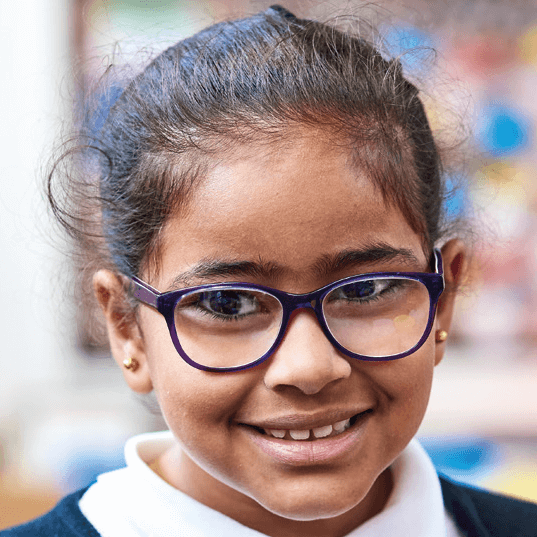 I like all the subjects but I’m best at art. I have responsibilities like counting the team tokens every Thursday. You get tokens for being good or doing good work. Every Friday the team that has won the most tokens is announced.
I like all the subjects but I’m best at art. I have responsibilities like counting the team tokens every Thursday. You get tokens for being good or doing good work. Every Friday the team that has won the most tokens is announced.
Jayda
 At some schools the teachers don’t really talk about what you do outside of school but at this school, if you achieve something, you can bring in your medals and show people. I really love DT because I like food.
At some schools the teachers don’t really talk about what you do outside of school but at this school, if you achieve something, you can bring in your medals and show people. I really love DT because I like food.
Marcus
 Most of the lessons are very educational but some of them are just fun. Once we made a volcano and I really enjoyed that. I like art, DT and literacy. I also like maths because that will help you in everyday life.
Most of the lessons are very educational but some of them are just fun. Once we made a volcano and I really enjoyed that. I like art, DT and literacy. I also like maths because that will help you in everyday life.
Raj
 The best thing about coming to this school is get to play with my friends and get support from the teachers. I like all the subjects we are taught. I like the clubs too. I’ve done computer club and Spanish club.
The best thing about coming to this school is get to play with my friends and get support from the teachers. I like all the subjects we are taught. I like the clubs too. I’ve done computer club and Spanish club.
Meet the staff
Samuel Adejoke, Y6 teacher & computer lead
 What makes the school special is the constant opportunities offered to everyone – the children, the staff. We’re like a giant family. The children embrace each other’s different cultures. Once you’re in here, you don’t want to leave. We listen to each other, whether teachers or students, and there’s a collaborative culture so we work together for the best outcomes.
What makes the school special is the constant opportunities offered to everyone – the children, the staff. We’re like a giant family. The children embrace each other’s different cultures. Once you’re in here, you don’t want to leave. We listen to each other, whether teachers or students, and there’s a collaborative culture so we work together for the best outcomes.
Polly Hristova, Y3 head
 I’ve been here since 2005 and I feel like part of the school. We look at the wider development of the child in its entirety, including wellbeing. We provide a lot of support for every different area of development. So it’s not just the academic aspects. All children have a sense of belonging here and the parents really appreciate that.
I’ve been here since 2005 and I feel like part of the school. We look at the wider development of the child in its entirety, including wellbeing. We provide a lot of support for every different area of development. So it’s not just the academic aspects. All children have a sense of belonging here and the parents really appreciate that.
Kate Miles, assistant head, SENDCo
 We’re very family and community oriented at this school. I was a class pupil here. I only left for secondary school really and came back. I did my training here and worked my way up. I think CPD at this school is definitely key. SMT look at people and their interests and skills and are serious about developing them further.
We’re very family and community oriented at this school. I was a class pupil here. I only left for secondary school really and came back. I did my training here and worked my way up. I think CPD at this school is definitely key. SMT look at people and their interests and skills and are serious about developing them further.
Sam Turpin, PE
 I also came to school here. It’s a really inclusive. All cultures and all religions all get the same opportunity here. The children really enjoy the leadership opportunities. They can be peer mentors, and we have sports leaders in the playground every lunchtime. I think they thrive on it and it helps them interact with their peers in a positive way.
I also came to school here. It’s a really inclusive. All cultures and all religions all get the same opportunity here. The children really enjoy the leadership opportunities. They can be peer mentors, and we have sports leaders in the playground every lunchtime. I think they thrive on it and it helps them interact with their peers in a positive way.
5 ideas to magpie from Curwen Primary
Involve parents and build community links with specially themed weeks. Paul explains: “We have family week, international week and world of work week, where parents and outsiders come in to engage with the children.”
Build trust by actively engaging with the local area. “You have to be out there talking to them every day but also walking around the community,” says Paul. “I can walk around here now and most people will know me.”
Put trust in the children. Pupils at Curwen receive team tokens for good work and behaviour and are trusted to count the tokens themselves each week to find out the winner.
Use support staff effectively. “We don’t have support staff who just washing out pots,” explains Paul. “We have 15 members who have all been trained in Elklan, which is a speech and language programme, up to level three. They are an essential tool in working with a range of children.”
Treat all teaching staff as leaders. “They are leading that classroom,” says Paul. “It’s not me. They’re in charge of that learning.”




